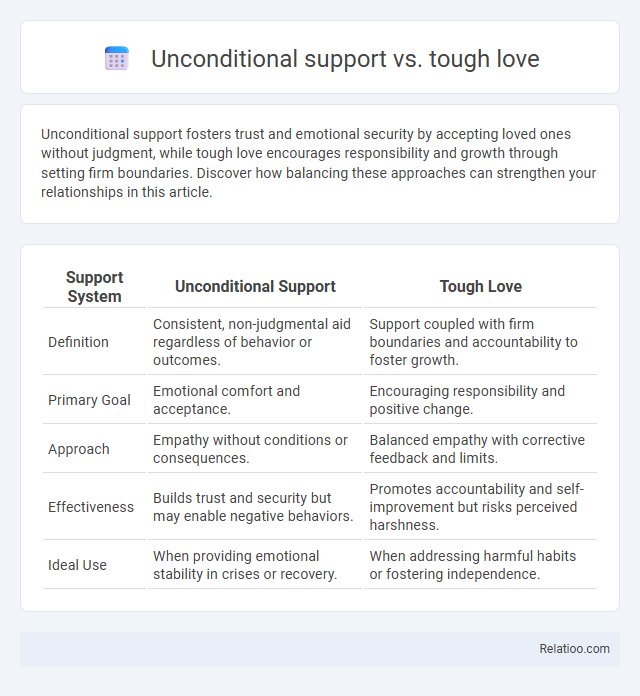Unconditional support fosters trust and emotional security by accepting loved ones without judgment, while tough love encourages responsibility and growth through setting firm boundaries. Discover how balancing these approaches can strengthen your relationships in this article.
Table of Comparison
| Support System | Unconditional Support | Tough Love |
|---|---|---|
| Definition | Consistent, non-judgmental aid regardless of behavior or outcomes. | Support coupled with firm boundaries and accountability to foster growth. |
| Primary Goal | Emotional comfort and acceptance. | Encouraging responsibility and positive change. |
| Approach | Empathy without conditions or consequences. | Balanced empathy with corrective feedback and limits. |
| Effectiveness | Builds trust and security but may enable negative behaviors. | Promotes accountability and self-improvement but risks perceived harshness. |
| Ideal Use | When providing emotional stability in crises or recovery. | When addressing harmful habits or fostering independence. |
Understanding Unconditional Support
Unconditional support means consistently standing by your loved ones without judgment, providing a safe space for growth and emotional security. Tough love involves setting firm boundaries and holding you accountable, emphasizing personal responsibility and development. Understanding unconditional support allows you to balance empathy with guidance, fostering resilience while maintaining trust and connection.
Defining Tough Love
Tough love involves setting firm boundaries and enforcing consequences to encourage personal growth and responsibility, distinguishing it from unconditional support, which offers constant acceptance without conditions. Your relationships benefit from understanding that tough love balances care with discipline, pushing individuals to learn from mistakes while feeling supported. Emphasizing this approach fosters resilience and accountability while maintaining a foundation of unconditional care.
Core Principles of Each Approach
Unconditional support centers on providing consistent care and acceptance regardless of circumstances, fostering a secure and trusting environment. Tough love emphasizes discipline and accountability, encouraging personal growth through clear boundaries and consequences. Your understanding of these approaches helps tailor relationships that balance empathy with structure, promoting both emotional safety and responsible behavior.
Psychological Impacts on Recipients
Unconditional support fosters secure attachment and boosts self-esteem by providing recipients with unwavering acceptance, promoting emotional stability and resilience. Tough love, characterized by clear boundaries and accountability, can encourage personal growth and responsibility but may induce stress or feelings of rejection if perceived as harsh. Balancing unconditional acceptance with constructive challenges tends to optimize psychological well-being, nurturing both confidence and adaptive coping mechanisms in recipients.
Situational Effectiveness: When Each Works Best
Unconditional support fosters emotional security and trust in relationships, making it most effective during times of vulnerability or trauma. Tough love promotes accountability and personal growth, especially when your loved one faces destructive behaviors or patterns that require firm boundaries. Situational effectiveness depends on balancing empathy with firmness to tailor your approach, ensuring your support maximizes positive outcomes for your individual's unique needs.
Risks and Benefits of Unconditional Support
Unconditional support offers profound emotional security by affirming Your worth without conditions, fostering strong self-esteem and resilience during challenging times. However, this approach risks enabling harmful behaviors if boundaries are not maintained, potentially impeding personal growth and accountability. Balancing unconditional support with clear limits ensures You provide nurturing care while encouraging responsibility and positive change.
Potential Consequences of Tough Love
Tough love in parenting or relationships aims to promote responsibility by setting strict boundaries and consequences, yet it can risk damaging emotional security if perceived as harsh or punitive. Potential consequences of tough love include increased anxiety, feelings of rejection, and strained trust, potentially undermining long-term emotional resilience. Unconditional support, in contrast, fosters a stable environment for growth by offering consistent acceptance, reducing emotional stress, and encouraging positive development without fear of judgment.
Balancing Empathy and Accountability
Balancing empathy and accountability requires understanding the nuances between unconditional support, tough love, and unconditional approaches. Unconditional support prioritizes emotional safety and acceptance, fostering trust and resilience, while tough love emphasizes setting boundaries and consequences to encourage responsibility and growth. Your approach should integrate compassionate understanding with clear expectations to promote both emotional well-being and personal accountability.
Real-Life Examples and Case Studies
Unconditional support in parenting is exemplified by parents who consistently offer encouragement and acceptance regardless of their child's behavior, fostering secure attachment and emotional resilience. Tough love, demonstrated in rehab programs and intervention cases, involves setting firm boundaries and consequences to promote responsibility, often leading to successful behavior change in individuals struggling with addiction or delinquency. Case studies comparing these approaches reveal that combining unconditional support with strategic toughness yields optimal outcomes in nurturing accountability while maintaining emotional security.
Choosing the Right Approach for Growth
Choosing the right approach for growth depends on Your unique needs and circumstances, balancing unconditional support with tough love effectively fosters resilience and confidence. Unconditional support offers consistent encouragement and acceptance, essential for emotional security, while tough love emphasizes accountability and discipline to promote personal responsibility. Understanding when to apply empathy versus firmness allows for a tailored strategy that drives sustainable development and meaningful progress.

Infographic: Unconditional support vs Tough love
 relatioo.com
relatioo.com